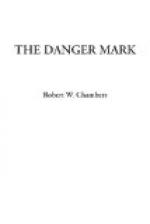“You certainly resemble a scratch opera chorus,” he observed after passing in review the sheepish line-up in his room. “Delancy, you’re the limit as a Black Mousquetier—and, by the way, there weren’t any in the reign of Louis XVI, so perhaps that evens up matters. Dysart is the only man who looks the real thing—or would if he’d remove that monocle. As for Bunny and the Pink ’un, they ought to be in vaudeville singing la-la-la.”
“That’s really a compliment to our legs,” observed Reggie Wye to Bunbury Gray, flourishing his property sword and gracefully performing a pas seul a la Genee.
Dysart, who had been sullen all day, regarded them morosely.
Scott Seagrave, in his conventional abbe’s costume of black and white, excessively bored, stood by the window trying to catch a glimpse of the lake to see whether any decent fish were breaking, while Scott walked around him critically, not much edified by his costume or the way he wore it.
“You’re a sad and self-conscious-looking bunch,” he concluded. “Scott, I suppose you’ll insist on wearing your mustache and eyeglasses.”
“You bet,” said Scott simply.
“All right. And kindly beat it. I want to try on my own plumage in peace.”
So the costumed ones trooped off to their own quarters with the half-ashamed smirk usually worn by the American male who has persuaded himself to frivolity. Delancy Grandcourt tramped away down the hall banging his big sword, jingling his spurs, and flapping his loose boots. The Pink ’un and Bunbury Gray slunk off into obscurity, and Scott wandered back through the long hall until a black-and-red tiger moth attracted his attention, and he forgot his annoying appearance in frantic efforts to capture the brilliant moth.
Dysart, who had been left alone with Duane in the latter’s room, contemplated himself sullenly in the mirror while Duane, seated on the window sill, waited for him to go.
“You think I ought to eliminate my eye-glass?” asked Dysart, still inspecting himself.
“Yes, in deference to the conventional prejudice of the times. Nobody wore ’em at that period.”
“You seem to be a stickler for convention—of the Louis XVI sort more than for the XIX century variety,” remarked Dysart with a sneer.
Duane looked up from his bored contemplation of the rug.
“You think I’m unconventional?” he asked with a smile.
“I believe I suggested something of the sort to my wife the other day.”
“Ah,” said Duane blandly, “does she agree with you, Dysart?”
“No doubt she does, because your tendencies toward the unconventional have been the subject of unpleasant comment recently.”
“By some of your debutante conquests? You mustn’t believe all they tell you.”
“My own eyes and ears are competent witnesses. Do you understand me now?”
“No. Neither do you. Don’t rely on such witnesses, Dysart; they lack character to corroborate them. Ask your wife to confirm me—if you ever find time enough to ask her anything.”




